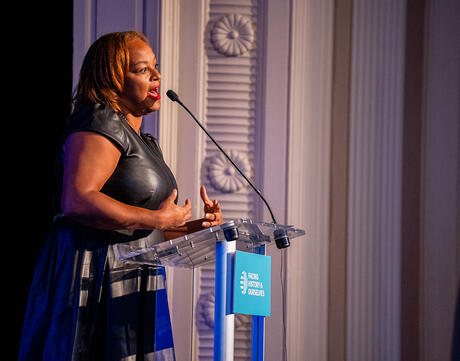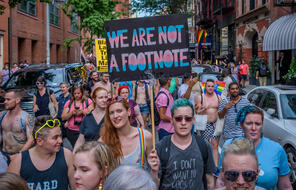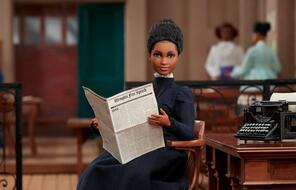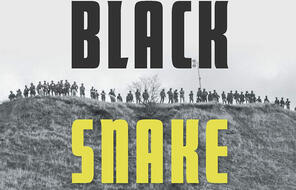
Bringing Down Barriers in Schools
I think all of us can recall an impactful moment from our school experience. I’ve been fortunate to have many amazing educational moments and one of my most memorable was from my kindergarten teacher. She had the incredible power of making me—and all of her young students—feel seen and valued.
She sent me a letter, in the mail, welcoming me to her classroom, and she saw the best in me as a student. I received another letter the summer following kindergarten when she learned that I had transferred to a new school. It wasn’t until years later in high school that I learned that she sent a letter to all of her students.
The tone that was set in my kindergarten classroom was one of discovery, engagement, and kindness. Throughout the year, even though I can’t remember exact lessons, I recall different conversations and interactions. For instance, I can tell you that when my peers and I had breakfast together, my classmate Lily ate congee. When I asked her what it was, she explained, “It’s kinda like oatmeal.” We continued to talk and Lily asked, “Do you eat rice?” I responded, “Yeah, my mom sometimes makes rice for breakfast. I don’t like it.” She said, “I don’t really like congee either.”
I remember my kindergarten teacher introduced us to stories about difference and culture by looking at folk music. She allowed me to develop a love of learning and a confidence that I could do anything that I imagined. I still remember her teaching us about singer Ms. Ella Jenkins who imbued African American culture through her songs.
When I became a principal, I wanted to recreate that environment of belonging and build a school culture where everyone felt seen, important and valued. My goal was to find meaningful ways to support students, enhance the curriculum, and strengthen our community. Research demonstrates that when students feel valued, included, and safe that they are better able to learn, be curious, and find voice. The question was: how to get there.
Facing History was the answer. After attending a Facing History Leadership Summit I knew that I had found what I needed—what our school needed. We started to incorporate Facing History into our school curriculum and in 2015 we became a Partner School.
Lenart, where I am principal, is a unique community. While we are located in Chicago’s South Side in the West Chatham neighborhood, our students come from all over the city, from Norwood Park to Pullman. Our students are truly diverse: racially, geographically, culturally, and socio-economically. This means that my students are often faced with differences.
It can be easy for schools to not pay attention to the conversations students are having around differences and instead try to focus on metrics like achieving the highest test scores. We often think that if we ignore something that students will forget about it and move on. And oftentimes that is because of our own fears as adults. The fact is that we don’t always know what to do with difference.
There was a distinct period in my career where Lenart educators and I needed to support our students in noticing difference while also modeling for them how important it is to understand what to do with difference and how to care for others. accepting and respecting those differences. This was during the height of the pandemic and we were trying to figure out how to implement hybrid learning. Many of our students, staff, and families were fearful. Students were trying to make sense of concepts such as quarantining, pods, vaccines, when to mask, when not to mask.
Soon enough some students were coming into the classroom and repeating what they were hearing our politicians, the news, and maybe their parents say at home about the pandemic. One line that we heard repeated at school was that China was to blame for COVID. Our students were grappling to find answers to the disruption in the world. They may not have been saying this with malice, but still, it had a definite impact on other students in the classroom and to the community that we had established.
My fellow school leaders and I had to find a way to address this issue while also navigating the other hardships we were experiencing. We needed guidance—and Facing History was there!
Facing History’s team partnered with Lenart to find resources that allowed our students to unpack what they were hearing in the news and at home. We were able to fall back on the work our students had been doing around identity, and more importantly Facing History gave the adults the tools they needed to engage in difficult conversations.
There’s a James Berry poem well-known to may in the Facing History network that ends with these lines:
What do we do with a difference?
Do we communicate to it,
let application acknowledge it
for barriers to fall down?
Bringing down barriers is what we need to be doing in schools in Chicago, across Illinois, and around the world.
When I asked the parents at my school what their hopes were for their children, they all said their hope was for them to be good people and good citizens. Facing History provides educators with the tools to help make our students find and nurture that goodness.
As a proud Chicago Native, whose father was a Chicago police officer and mother was a Chicago Public Schools educator, I have hope for our city, our nation, and our world—I have hope because of Facing History.
After seeing the impact Facing History has had in my life and on my school, I know that their programming and outreach is resonating the same way in Facing History schools across the globe. Our children will be well prepared to be civic leaders and upstanders because of Facing History.
Angela Sims is the principal of Ted Lenart Regional Gifted Center on the South Side of Chicago. Lenart has been a Facing History Partner School since 2015.













